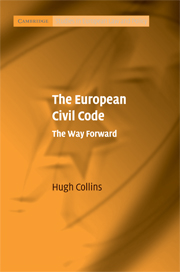Book contents
- Frontmatter
- Contents
- Preface
- Series editors' Preface
- Table of cases
- Table of treaties and legislation
- I Civil society and political union
- II The acquis communautaire in private law
- III The hidden code
- IV Private law and the Economic Constitution
- V Cultural diversity and European identity
- VI Respecting legal diversity
- VII Multi-level private law
- VIII Strengthening convergence
- IX Exploring the European Social Model
- Index
- CAMBRIDGE STUDIES IN EUROPEAN LAW AND POLICY
- References
III - The hidden code
Published online by Cambridge University Press: 26 February 2010
- Frontmatter
- Contents
- Preface
- Series editors' Preface
- Table of cases
- Table of treaties and legislation
- I Civil society and political union
- II The acquis communautaire in private law
- III The hidden code
- IV Private law and the Economic Constitution
- V Cultural diversity and European identity
- VI Respecting legal diversity
- VII Multi-level private law
- VIII Strengthening convergence
- IX Exploring the European Social Model
- Index
- CAMBRIDGE STUDIES IN EUROPEAN LAW AND POLICY
- References
Summary
Given the unsatisfactory characteristics of the acquis communautaire outlined in chapter II, it was predictable that these European laws would be criticised for their lack of systematic coherence, internal inconsistencies and incompleteness. To lawyers the Directives appeared like uncharted reefs on which transactions might unexpectedly be dashed. These apparent defects in the acquis troubled legal scholars especially. German scholars, who tend to celebrate the systematic and rational qualities of their private law code, disliked particularly the ‘pointilliste’ character of the sector-specific legislation which, unlike the paintings in this style, was hard to present as coherent no matter from what vantage-point the acquis was observed. It was not surprising, therefore, when the Commission published in 2003 its Action Plan for further work on contract law that it was entitled A More Coherent European Contract Law.
In that Action Plan, a part of the agenda set by the Commission was to improve the quality of European legislation by rendering it more coherent and internally consistent. The acquis could be improved, it was asserted, by adopting standard terminology and concepts, by providing greater specificity in some instances, and by dealing with potential overlaps between different measures more thoroughly. It was argued that these improvements would not only achieve greater coherence but also contribute to more consistent application by national courts of the Directives and the implementing national legislation. Yet the agenda set by the Commission was not confined to this proposal for revisions of existing European laws.
- Type
- Chapter
- Information
- The European Civil CodeThe Way Forward, pp. 63 - 90Publisher: Cambridge University PressPrint publication year: 2008
References
- 1
- Cited by



